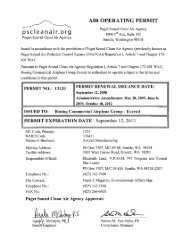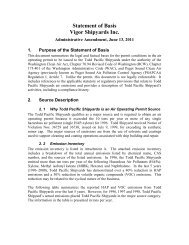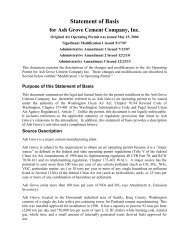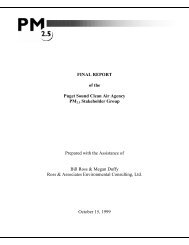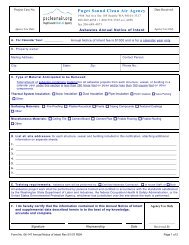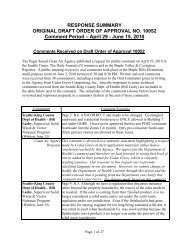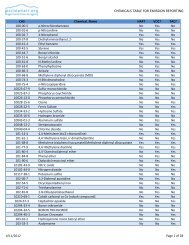Additional Comments Summary Response to Additional Comments
Additional Comments Summary Response to Additional Comments
Additional Comments Summary Response to Additional Comments
Create successful ePaper yourself
Turn your PDF publications into a flip-book with our unique Google optimized e-Paper software.
RESPONSE SUMMARY<br />
REVISED DRAFT ORDER OF APPROVAL NO. 10052<br />
Comment Period – September 13 – Oc<strong>to</strong>ber 28, 2010<br />
Commenter<br />
Comment Synopsis<br />
didn't have the time during the day <strong>to</strong> hang around waiting for someone<br />
from your agency <strong>to</strong> fill out a complaint form. I feel this<br />
provision would allow me <strong>to</strong> be heard when there is a problem without<br />
further disrupting my life.<br />
Cathy and Doug Brandt<br />
(Written 10/28/2010)<br />
Secondly, I would like <strong>to</strong> address the subjectivity of what constitutes a<br />
level 2 odor. Every citation PSCAA writes can be legally challenged by<br />
Cedar Grove Composting. This adds up <strong>to</strong> significant legal costs for<br />
PSCAA at the taxpayers expense. At the meeting, a couple people<br />
commented on whether PSCAA had the ability <strong>to</strong> take air quality<br />
measurements and <strong>to</strong> try <strong>to</strong> find out what it is that we are breathing. If<br />
this equipment exists, Cedar Grove should be required <strong>to</strong> front the costs<br />
for PSCAA <strong>to</strong> purchase and maintain the equipment as long as they<br />
continue <strong>to</strong> have a significant number of odor complaints. Certainly<br />
having a scientific basis for these odors would dramatically reduce any<br />
legal challenges. I read an interesting article about "field olfac<strong>to</strong>meters"<br />
and was thinking this might be one thing that could be used. Here is a<br />
copy of that link<br />
http://www.jgpress.com/archives/_free/000435.html. The information I<br />
was interested in is under the heading "Quantifying Compost Odors."<br />
Lastly, I would like <strong>to</strong> emphasize the need for larger fines. Cedar<br />
Grove Composting has demonstrated that the current fine amounts are<br />
simply being absorbed as operating costs. At least a portion of this<br />
money should go <strong>to</strong> PSCAA <strong>to</strong> recoup the expenses the agency incurs<br />
while the composting facility repeatedly violates their operating<br />
requirements.<br />
My husband and I have lived on the <strong>to</strong>p of Squak Mt. (between<br />
Issaquah and Ren<strong>to</strong>n) for 6 years. We are often disturbed by an strong<br />
odor that smells like manure, or what we now know <strong>to</strong> be rotting<br />
compost. We always wondered where the smell was coming from since<br />
it was so detectable and we knew there weren't any neighbors below us<br />
that had spread compost (we are the highest residence on this<br />
mountain).<br />
This odor occurred so frequently that we started <strong>to</strong> research the issue<br />
a while back. Unfortunately we didn't research everything when we<br />
bought this property, and were unaware that it was apparently<br />
condemned or devalued at one time due <strong>to</strong> the smell coming from the<br />
Cedar Grove Compost facility. We should note that we are completely<br />
natural/organic up here, and rarely purchase compost. We have our<br />
own tumbling composter which we fill only with dropped leaves and<br />
other debris from our native trees/plants (and all non-native



